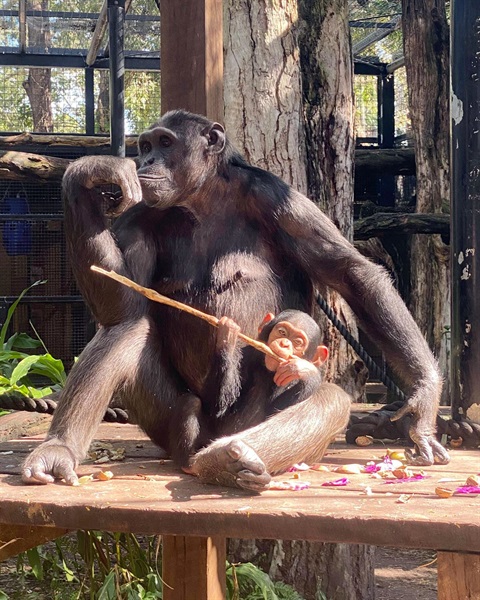Rockhampton Zoo announces important changes to chimpanzee troop
Published on 17 September 2024

Rockhampton Regional Council has today endorsed an important decision that will shape the future of the chimpanzee troop at Rockhampton Zoo, while contributing to the conservation of this endangered species.
As part of a carefully considered plan, Rockhampton Zoo’s chimpanzees, Leakey and her three-year-old infant, Mzuri, will be transferred to Sydney Zoo. In their place, two female chimpanzees will join the Rockhampton troop in the near future.
Parks, Sport and Public Spaces Councillor Cherie Rutherford said while the decision has been difficult, it is in the best interests of the chimpanzees.
"This is not something we've decided lightly - Leakey and Mzuri hold a special place in the hearts of our community and our staff who care for them daily,” Cr Rutherford said.
"This decision has been made following extensive consultation with species experts and is part of Rockhampton Zoo’s participation in the Species Management Program – which is coordinated by the Zoo and Aquarium Association and aims to preserve chimpanzee populations across Australasia.
“Leakey and Mzuri will join a troop of eight chimpanzees at Sydney Zoo next month, where they’ll form new bonds and receive expert care.
“Rockhampton Zoo will then welcome an 18-year-old female chimpanzee from Sydney Zoo soon after, with a 12-year-old female from Seoul joining the troop in the first half of next year.
“We will keep the community updated on the progress of both troops and we are confident that they will all settle well and be very happy.”
Rockhampton Zoo Team Leader of Exotic Mammals and Birds and Chimpanzee Expert, Blair Chapman said the transfer will create new breeding opportunities for both troops, which is incredibly important for the Australasian chimpanzee population.
"Leakey and our alpha male, Alon, are unrelated to all the chimpanzees in the region, which makes them incredibly valuable genetically for the future of the species," Mr Chapman said.
"This transfer opens new opportunities for breeding in both troops, supporting the Australasian chimpanzee populations.
Mr Chapman explained that movements between chimpanzee troops are common in the wild, particularly for female chimpanzees.
“As wildlife carers, we follow and encourage behaviours and patterns that take place in the wild,” Mr Chapman said.
"Female chimpanzees will disperse from their natal group at maturity and move to other troops. Sometimes, chimpanzees will travel and meet a couple of troops before they find one they will settle into – so joining a new troop or having new members join a troop is not uncommon.
“We also feel that this transfer will be positive for Leakey and her social needs.
"Leakey has struggled with the recent changes in the male hierarchy here at Rockhampton Zoo and after consulting with species coordinators and chimpanzee advisors, we believe she will thrive in a new troop where she can form fresh relationships without pre-existing dynamics," Mr Chapman explained.
The Zoo is confident the troop will adjust well, including Leakey’s older daughter Capri who will remain at Rockhampton Zoo.
"Capri has been very independent over the last year, often spending time away from her mum and nesting separately at night," Mr Chapman said.
"She is a very independent chimp in general and has formed strong bonds with the troop, so we believe she will adjust well within the new social structure."
Sydney Zoo Animal Care Manager for Primates and Species Coordinator for Chimpanzees for the Australasian Region Lou Grossfeldt echoed the importance of the collaboration between the zoos.
“We regularly collaborate on programs and behaviours and then collaborate with global partners who care for chimps in zoos and wildlife parks across the globe,” Ms Grossfeldt said.
“The chimpanzee troop at Sydney Zoo are a fantastic group with great age variation.
“In the wild, female chimpanzees like Leakey often come and go, and we replicate this behaviour where possible in our care. We’ll let the chimps drive the introduction process and work at their pace.
“There’s always excitement and high energy at first, but overall, we expect a smooth transition.”